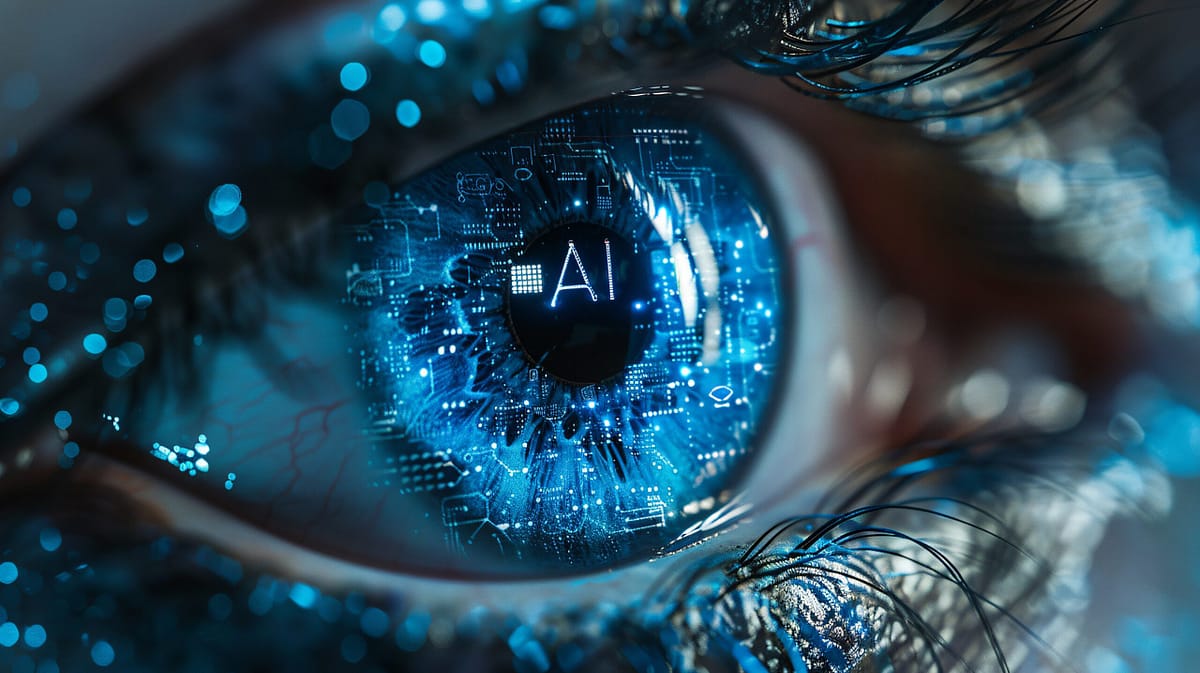AI as a Freelancer – Opportunities and Challenges

Can AI Replace Freelancers – Facts and Myths
In an era of rapid artificial intelligence (AI) advancement, more and more freelancers are asking themselves: can AI replace freelancers? Picture a typical freelancer’s morning – a cup of coffee, a laptop, and a to-do list. Until recently, everything depended on their own skills and time. Today, tools that can write texts, create graphics, or analyze data faster than humans are appearing right beside them. This mix of curiosity and concern sparks the question: will AI soon take over all our tasks in remote work?
Rather than seeing AI as a threat, it’s better to view it as a clever collaborator. AI tools for freelancers can assist in organizing work, automating repetitive tasks, generating ideas, and even supporting client interactions. This allows freelancers to focus on the creative side of their work and operate smarter, faster, and more efficiently. The question “can AI replace freelancers?” stops being just a scary thought – it becomes an opportunity to rethink and expand your skills.
In this article, we’ll explore specific changes in the freelancing industry driven by AI, highlight which professions are most at risk of automation, and show which roles benefit from new tools. We’ll also give tips on how to leverage artificial intelligence in remote work to boost productivity and earnings, treating AI as an assistant rather than a competitor. Together, we’ll consider can AI replace freelancers in the near future and what steps you can take today not just to keep up with changes, but to stay ahead of the competition.
Who Is a Freelancer Today? Can AI Replace Freelancers?
A freelancer today is much more than a graphic designer, copywriter, or programmer, as it used to be just a few years ago. The world of independent work has evolved at lightning speed and now includes dozens, even hundreds, of specializations that once sounded like science fiction. Alongside traditional roles, new positions have emerged such as prompt engineer (someone specializing in creating effective AI commands), AI marketing consultant, or digital product designer using no-code and low-code tools. Freelancing has transformed from just an alternative to a full-time job into a full-fledged economic ecosystem driving the digital economy.
Along with the expansion of specializations, the tools freelancers use have changed too. While a decade ago, premium software access was the biggest advantage, today basic AI toolkits are available to everyone. ChatGPT or Claude help create content, Midjourney, DALL·E, and Leonardo AI generate illustrations and visuals, while platforms like Zapier or Make.com allow you to automate processes in minutes that once took hours of tedious work. This shift democratizes the market – if everyone has access to similar technologies, the question arises: where does a freelancer’s true value lie?
The answer is far from straightforward. On one hand, AI levels the playing field – a client can generate text using ChatGPT or create graphics with a generator. On the other hand, it’s not just access to the tool, but how it’s used that determines the quality of the final result. An experienced freelancer still surpasses an amateur with industry knowledge, brief interpretation skills, understanding client psychology, and business context. It’s this strategic and creative layer that AI has not fully mastered yet.
So, it’s more accurate to say that AI doesn’t exactly “replace” freelancers, but rather changes the definition of their role. In 2025, freelancers rarely work like lone artisans doing everything manually. They are more like project managers or orchestra conductors, combining different tools and technologies to achieve the best possible outcome. True value is no longer just the ability to write a text or design a logo, but knowing how to combine human and artificial resources into a coherent, professional product.
In this sense, the question “can AI replace freelancers?” is too simplistic. A more precise question would be: “Which freelancers will AI replace, and who will benefit even more from it?” History of new technologies shows two groups – those who ignore changes and lose competitiveness, and those who adapt and leverage new tools to build an advantage. In freelancing 2025, the winners are the latter.
Therefore, modern freelancers should view AI not as a threat, but as a ally. Automating routine tasks frees up time for strategic thinking, client relationship development, finding innovative solutions, or deepening knowledge. These are areas where humans still outperform AI. Ultimately, AI can support work, but it’s the freelancer who gives meaning, direction, and a unique character to the projects they deliver.
Which Freelance Jobs Are at Risk of Automation? Can AI Replace Freelancers in These Roles?
Not all freelance roles are equally susceptible to being “taken over” by AI. The question “can AI replace freelancers” becomes particularly relevant when we look at industries already feeling the effects of automation. Here are some examples where changes are most noticeable:
- Copywriting: ChatGPT and other language models can generate advertising copy, product descriptions, and blog posts on a large scale. If someone offers low-quality, derivative content – AI can do it faster, cheaper, and often more effectively.
- Graphic design: Tools like Canva, Leonardo AI, or Midjourney allow even those without formal artistic education to create professional graphics in minutes, transforming traditional approaches to design work.
- Transcriptions, translations, summaries: Services based on “mechanical” text work are now almost fully automated thanks to advanced algorithms and AI models, posing a real challenge for freelancers performing these tasks.
In the context of these changes, it’s worth considering how freelancers can prepare for the AI era and which skills will help them avoid being replaced by machines. The answer to the question can AI replace freelancers is – in some areas, yes, but this doesn’t mean the end of freelancing; rather, it’s a transformation.
This doesn’t mean that AI takes away work. It means the definition of a freelancer’s added value is changing. Today, it’s not just writing content that matters, but the ability to write strategically – understanding user intent, context, SEO, and marketing.
Can AI Replace Freelancers? AI as a Partner, Not a Competitor

Many freelancers today wonder can AI replace freelancers, often seeing artificial intelligence as a rival “taking jobs.” Meanwhile, those who know how to use AI as a collaborative tool gain market advantage and work efficiency. Here are a few practical examples of how AI can support freelancers instead of replacing them:
- Copywriter: can use AI to draft initial versions of content, then focus on editing, personalizing, and adding a unique style that sets their work apart.
- Graphic Designer: leverages AI, such as Midjourney, to quickly generate moodboards and inspiration, which are then refined manually to match the client’s specific needs and branding.
- Marketer: uses AI to analyze data from marketing campaigns, enabling real-time optimization and faster response to market changes.
Automating tasks doesn’t mean automating thinking. The most valued freelancers of the future are those who think creatively and strategically, connect different threads, interpret data, and make informed decisions. This is precisely where the answer to whether AI can replace freelancers lies – AI is still far from replacing human intuition and approach, making human-machine collaboration the most valuable.
Can AI Replace Freelancers? How Freelancers Can Work Smarter with AI
Many freelancers ask themselves can AI replace freelancers. The answer is: not if we know how to work smarter, using AI to increase efficiency and scale income. Here are some concrete strategies to help you earn more while working less – through automation and AI collaboration:
1. Digital Products + AI = Passive Income
Instead of limiting yourself to client work, consider can AI replace freelancers for simple tasks, and use that time to create your own digital products. AI can help you quickly produce e-books, video courses, templates, or prompts that you can sell online. Tools like Notion, Canva, or Gumroad, as well as AI-powered content generators, can shorten the creation process from months to just a few days.
2. Service Packages, Not Single Tasks
Scale your business by offering ready-made packages (e.g., “3 SEO articles per month + report + AI analysis”). Use AI to shorten delivery time, but add your expert knowledge where it really counts.
3. Automate Communication
Use AI tools to write emails, briefs, proposals, or reports. Save hours every week. Tools: ChatGPT, Notion AI, Scribe, Tactiq.
4. Delegate and Expand Your Offer
Freelancers in 2025 often work as small teams supported by AI. You can collaborate with other freelancers to create group products – courses, e-books, webinars – each contributing their expertise while AI supports every stage of production.
Case Studies: How Freelancers Use AI to Scale Income
Theory is one thing, but let’s look at real examples of how earning from AI translations and other AI-assisted services allows freelancers to work smarter and more efficiently, increasing income while spending less time.
🎨 Anna – Graphic Designer Who Doubled Income with Midjourney and AI
Anna designed e-book covers and social media graphics. Her main challenge was the time-consuming process – from client briefs, through sketches, to project finalization. After implementing Midjourney, she started generating inspirational sketches and concept variations in 15 minutes, cutting the design process by 60%.
This allowed her to take on more projects or focus on selling her own graphic bundles. Today, she also runs an Etsy store selling ready-made templates and “AI-generated backgrounds” packages.
✍️ Michał – SEO Copywriter Working with ChatGPT, Expanding Earnings from AI Translations and Other Content
Michał specializes in long blog articles for e-commerce stores. Previously, a single article took him 6–8 hours. Now he works in an “AI-assisted” model: ChatGPT drafts the outline and gathers data, Michał edits and adds SEO insights and internal linking.
His working time has been reduced to 2 hours per article. This allows him to take on more clients, as well as spend time creating his own newsletter and a beginner’s course for AI copywriters, including earning from AI translations.
💻 Jakub – Developer Building Products with No-Code + AI, Automating Earnings from AI Translations and More
Jakub created 3 micro-apps using Webflow, Zapier, ChatGPT, and Airtable. One of them – an automated proposal generator for real estate agencies – brings him passive income of around 2,000 PLN per month. He doesn’t need a team – AI writes the proposal texts, the system sends emails, and the landing page runs fully automatically.
The Future of Freelancing with AI – Looking Towards 2030

Freelancing is entering a new era where artificial intelligence not only supports daily work but becomes an integral part of the entire service delivery process. According to many forecasts, by 2030 the job market will look very different than it does today – both in terms of tools and client expectations. Therefore, the question to ask is not “can AI replace freelancers?”, but rather “how will freelancing change when AI becomes a permanent part of it?”
Most Freelancers Will Use at Least 2–3 AI Tools Daily
Even today, many specialists can’t imagine working without AI support. Copywriters rely on ChatGPT, designers use Midjourney, and marketers automate campaigns with Zapier. By 2030, this will become standard – just as no one today questions whether a computer with internet access is necessary for work. Every freelancer will have at least a few specialized AI tools in their arsenal, tailored to their industry. In practice, this means that competitive advantage won’t go to those who simply “use AI,” but to those who know how to combine different solutions in unique ways. Once again, the question can AI replace freelancers is reframed: it won’t replace those who master AI collaboration, but it will challenge those who don’t.
Manual Work Will Become a Luxury
Until recently, clients paid freelancers mainly for time and manual effort – writing an article, designing a graphic, or coding a website from scratch. In the future, fully manual work will be treated as something exclusive and therefore more expensive. Mass-market clients will expect maximum efficiency supported by AI – faster, cheaper, and at greater scale. Tasks requiring 100% human originality, without AI involvement, will become premium products. This opens a niche for freelancers who consciously choose to create “digital craftsmanship” – unique content, graphic designs, or code valued for their human touch. For anyone wondering can AI replace freelancers, the answer is clear: AI changes the rules, but human creativity will remain irreplaceable.
New Freelance Roles Will Emerge
History shows that every technological revolution creates new professional roles, and AI is no exception. Already, demand is rising for AI coaches, professionals teaching teams how to effectively implement artificial intelligence in daily work. The role of a prompt consultant, specializing in crafting precise commands for language and graphic AI models, is also gaining popularity. By 2030, new roles will continue to emerge – for example, AI-generated data auditors who ensure that AI-generated content and results comply with legal, ethical, and quality standards. This proves that freelancing will not only rely on AI but will actively build new pillars of growth. So, for anyone still asking can AI replace freelancers, the answer is nuanced: AI will transform roles, create opportunities, and reward those who embrace its potential.
Soft Skills Will Become Even More Important
Paradoxically, the more advanced AI tools become, the more crucial human competencies that algorithms cannot fully replicate will be. By 2030, soft skills – empathy, communication, strategic thinking, and analyzing problems in a broader context – will be essential. Clients will need not just executors but advisors who help them understand how to best leverage AI in their business. A freelancer who listens, asks the right questions, and translates client needs into AI-supported solutions will remain irreplaceable. In this context, the question can AI replace freelancers is no longer relevant – it’s about who can collaborate effectively with AI and who falls behind.
Looking ahead to 2030, the real challenge isn’t whether AI will “replace” freelancers. The true question is: who will learn to work better with AI, and who will be left behind? Those who treat artificial intelligence as a partner and a tool for growth will unlock tremendous opportunities. Those who ignore it risk losing their market position faster than they expect. The future of freelancing will favor those who embrace AI in freelancing, master AI tools for freelancers, and understand the future of freelancing in a world of automation.
Can AI Replace Freelancers? Freelancer + AI – Checklist
If you’re wondering can AI replace freelancers, this practical checklist will help you implement effective solutions that let you earn smarter in the age of artificial intelligence:
- 🔹 Review your services and identify which tasks can be automated with AI
- 🔹 Master one AI tool from A to Z (e.g., ChatGPT, Midjourney, Notion AI) – a fundamental step in modern freelancing
- 🔹 Build your personal brand – remember, AI cannot replace freelancers in creating trust and relationships
- 🔹 Create digital products – AI can help you develop and sell them, generating additional income
- 🔹 Maintain a newsletter or blog – demonstrate how you use AI in practice, standing out from the competition
- 🔹 Position yourself as an expert and conscious AI user, not an opponent
Summary: Can AI Replace Freelancers? AI as a Tool, Not a Threat
A modern freelancer in 2025 has access to tools that were unimaginable just a few years ago. Freelancer automation through AI allows rapid content generation, graphic creation, and automation of repetitive processes. ChatGPT, Midjourney, Zapier, and Make.com are examples of AI tools for freelancers that transform daily work. On the other hand, access to the same technologies is available to everyone, increasing competition and creating new challenges. In this context, the question “can AI replace freelancers?” becomes more complex.
The answer lies in smart and strategic use of AI. In AI in freelancing, it’s not about mechanically copying content or generating graphics without context. The key is accelerating processes, testing ideas, analyzing data, and delivering real value to clients. A freelancer who can combine multiple AI tools for freelancers into a coherent workflow becomes a true project partner, not just a task executor.
We must not forget that AI cannot replace a freelancer’s creativity, experience, or trust. Algorithms can analyze data, generate content suggestions, or create visuals, but they cannot replicate the subtleties of communication, intuition, or strategic thinking. These are precisely the qualities that set a freelancer apart from the competition and maintain high-quality services, even in a world where freelancer automation is becoming standard.
In summary, the question “Can AI replace a freelancer?” should be reframed as: “Who can collaborate most effectively with AI and leverage AI in freelancing to create real value?” A freelancer who understands automation, knows the best AI tools for freelancers, and combines them with human skills will not only survive in the market but gain a competitive edge.
The bottom line is clear: AI cannot replace a freelancer if used consciously and strategically. Freelancer automation is a huge opportunity – it accelerates workflows, increases efficiency, and frees up more time for creativity, consulting, and building client relationships. In an era of global competition and rapid technological change, success belongs to those who treat AI not as a rival but as a tool for growth and advantage in freelance work.
Expert Advice
The editorial team, together with independent‑work and AI‑integration experts, emphasizes that AI will not simply replace freelancers — it reshapes freelancing opportunities. Freelancers who treat AI as a tool rather than a rival gain a competitive advantage.
For example, the 2025 report by Useme – AI & Future of Freelancing Report shows that only around 12 % of companies plan to reduce collaboration with freelancers due to AI; most companies continue to value human creativity, flexibility, and strategic insight.
Additionally, industry analysis indicates that demand is shifting: routine tasks such as basic writing or simple design are increasingly automated, while tasks requiring judgment, creativity, and strategic thinking grow in importance. (PlainEnglish AI, 2024)
- Use AI to boost productivity: let AI handle repetitive tasks, research, and drafts to focus on high-value creative or strategic work.
- Diversify your services: offer editing of AI outputs, project management, consulting, or creative direction, not just execution.
- Keep learning: as AI evolves, clients will value freelancers who understand both technology and human insight — prioritize continuous skill development.
- Be transparent and ethical: inform clients about AI use, maintain quality, and ensure authenticity to build trust.
In conclusion, AI is not the end of freelancing — it’s a turning point. Freelancers who combine human strengths such as creativity, judgment, and empathy with AI efficiency can build resilient, future-proof careers. Success in 2025 and beyond belongs to those who treat AI as a collaborator rather than a competitor.
Support My Work
Thank you for reading this post! If you found it helpful, you can buy me a coffee ☕.
It’s a huge motivation for me to continue creating content about online earning and AI.

Sebastian is an AI and digital marketing expert who has been testing online tools and revenue-generating strategies for years. This article was prepared by him in collaboration with our team of experts, who contribute their knowledge in content marketing, UX, process automation, and programming. Our goal is to provide reliable, practical, and valuable information that helps readers implement effective online strategies.
